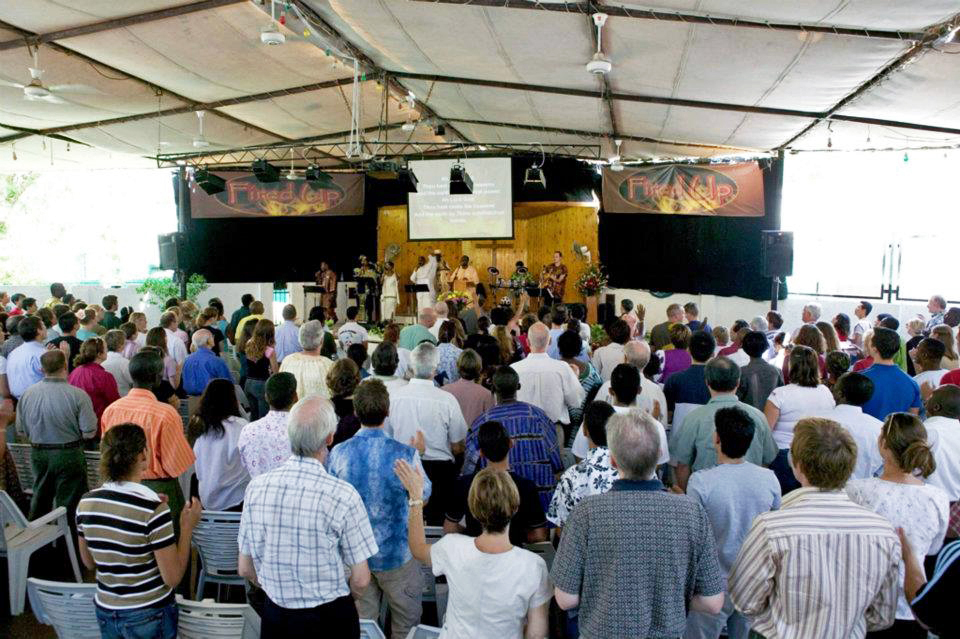These three words are repeated six times every single Sunday in my congregation as the congregational response to the communion liturgy. We pray them in earnest that the third person of the Godhead would make His presence known in our gathering and would mediate to us the elements of the Lord’s Supper. In the time of worship that precedes the preached word and the celebration of the table, we might sing lyrics like “Holy Spirit you are welcome here,” or “Spirit lead me where my trust is without borders // Let me walk upon the waters // Wherever You would call me.”
At the end of every service we pray together our vision prayer 1 which includes the petition for God to transform us into “Spirit-filled” people. I imagine that the experience in your congregation is similar, if not even more focused on the Holy Spirit than mine, and yet I have noticed that, even though we seem to be asking for the Holy Spirit to come into our worship, fellowship, and discipleship more today in the C&MA than we have in generations, we’re not always sure what we are supposed to be asking Him to do when He makes Himself known. This is where I have found the legacy of A.B. Simpson and his intentionally Christ-centred theology of the Holy Spirit to be of great help in untangling these questions.
Knowing what Simpson believed about the relationship between Christ and the Holy Spirit can be illuminating. For Simpson, the incarnate Christ’s dependence upon the Holy Spirit was instructional; He lived not out of His own power but out of the power of the Spirit for our sake. In that way, we could know the power that is available to us as a real gift and not as an impossible aspiration for “as surely as He overcame through the Holy Ghost, so may we.”2
In this way, Simpson understood the believer’s experience of God to be fully and unreservedly centred on the person of Jesus Christ. The basic premise of Simpson’s argument in his famous sermon, Himself, is that all of the benefits of a life in Christ come only, and fully, when the believer seeks Christ, “himself,” rather than the benefits themselves. Even more than that, the real blessings are not to be found in vitality or miracles or wisdom or power, but in union with Christ. He, Himself, is the precious treasure of the Christian life. Simpson understood that this union was accomplished through the Spirit. Not that the union was with the Spirit, but that the Spirit makes possible, through His indwelling, the union of the believer with Christ. The Spirit comes to the believer not as a distinct person (although He certainly is) but as the Spirit who has dwelled in Christ and who brings with Him the abiding presence of Christ as a product of that union with Jesus in the incarnation. In all ways, therefore, what the Holy Spirit brings us is a union centred in, and wholly dependent upon, Christ.
For this reason, Simpson taught that the union is obtained by seeking Christ Himself, and not by seeking the Holy Spirit. It is easy to see how being instructed to seek this baptism of the Spirit could lead someone to conclude that what they are looking for is a fuller experience of the Holy Spirit, but a more careful examination of what Simpson teaches here reveals that it is not the Spirit who is sought in baptism, but Christ.
“He [Jesus] is able to clear it all away. Come to His blessed feet, come to His sprinkled blood, come to His throne of grace, come to the great Sacrifice, come to the cross of Calvary, come to the great High Priest, come to Jesus, and He will cleanse you by His blood, and baptize you with His Holy Spirit.”3
What Simpson is saying here is that we do not get the Holy Spirit by seeking the Spirit—we get the Spirit by seeking Christ. Jesus is the material cause of our filling as well as the instrumental cause. A mistake that some people make is that they picture Christ as far away in the heavenlies at the right hand of God while the Spirit is intimately connected with them, and thus favour the Spirit—however this is not the case, because the Spirit indwells us, not with His own presence, but with the very presence of Christ.The life to which the Holy Spirit brings the believer is the life of Christ—not the life of the Spirit, “to be filled with the Spirit, then, is to be filled with Christ, and so live that our constant experience and testimony will be, ‘I live; yet not I, but Christ lives in me...’”4
The vision prayer of the C&MA in Canada is that we would be a movement of people who long for God, and who long to be transformed into Christ-centred, Spirit-empowered, and Mission-focused people. This lines up well with Simpson’s dual priorities of the Deeper Life in Christ, and hastening Christ’s return by proclaiming the Gospel to all peoples. Being Christ-centred and Mission-focused are the two pillars that the movement was built upon, but what about our prayer to be Spirit-empowered? Although not as explicit, Simpson would have wholeheartedly agreed with this priority because the work and empowering of the Holy Spirit is the means by which the believer can be both Christ-centred and Mission-focused. The Holy Spirit is the connective tissue between the goal of spiritual union with Christ and the goal of physical reunion with Christ in His return. He is the one that makes it all possible!
When we ask the Holy Spirit for guidance, what we are asking for is for Him to give us the mind of Christ.
When we ask the Holy Spirit for power for holy living, it is the power of the resurrected Christ that we are seeking in our lives through the union that the Spirit makes possible.
When we pray “Come Holy Spirit,” what we are really asking for is more of Jesus. And, whether that Holy Spirit language that we are rediscovering in many of our churches is familiar and comforting to you, or strange and worrying—if what we are seeking is more of Jesus, I hope that is something we can all agree with.
1 O God, with all our hearts, we long for You. Come, transform us to be Christ-centred, Spirit-empowered, Mission-focused people, multiplying disciples everywhere.
2 A. B. Simpson, “The Holy Spirit” or “Power from on High” All Volumes, Combined edition (CreateSpace Independent Publishing Platform, 2017), 104.
3 A. B. Simpson, The Names of Jesus (CreateSpace Independent Publishing Platform, 2014), chap. 14.
4 Simpson, “The Holy Spirit” or “Power from on High” All Volumes, 131.
Share:
Find more posts about:
Chris Smith
Support the mission
The Global Advance Fund (GAF) is a pooled fund that supports our workers in Canada and around the world to share the Gospel with people who haven't yet heard the name of Jesus. Your continued generosity equips and sustains our workers and their ministry.









The Holy Spirit comes when we surrender our Lives to Jesus! It is a complete Package! The Spirit guides us in His Perfect Will for our lives!….we do NOT NEED TO GET ALL EMOTIONAL , HIS VOICE IS CALM,!
For many years, I thought, you had to “ get holy”, by the “feeling”, and then look down on those who are not “filled”! I never felt, I was “holly”. Enough?
You don’t have to keep on calling the Holy Spirit to come every time you need the filling to satisfy your emotion, because you feel the lack of Him. Ephesians 1:13 says, “we are sealed with the Holy Spirit,” when you believe. Ephesians 4: 30 says, you were sealed until the day of redemption (or until you go to glory). Jesus promised He never leave you comfortless, John 14:8. He shall dwell with you, meaning Jesus will live in us through the Holy Spirit. He is not under your command either that you can summon the Holy Spirit, whenever you feel empty so you need a fill. We don’t feel we are filled when we don’t surrender our self to Him. And why we should always depend on our feeling when we have the Word of God. We have to believe what the Scripture says.